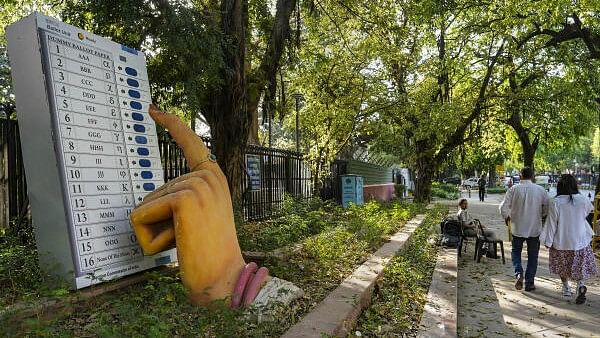
Model of Electronic Voting Machine (EVM) outside Election Commission of India office.
Credit: PTI Photo
As the world's largest democracy braces for its general elections, the Election Commission of India's (ECI) role has become increasingly crucial in ensuring a transparent, free and fair elections.
Established on January 25, 1950, the ECI stands as a bulwark against electoral malpractices, ensuring that the voice of the people resonates freely and without bias. It operates as a constitutional authority, insulated from political influence, fostering an environment for impartial electoral process.
Let's take a look at how the ECI prepares for polls and how the Model Code of Conduct comes in place to ensure transparency.
Pre-poll preparation
Months prior to the conduction of elections, ECI plans every aspect of the electoral process. Ensuring a transparent procedure, it conducts voter registration drives, deploys security personnel, ensures the availability of adequate supplies and double check all the nitty grits required for the polls.
Model Code of Conduct
Model Code of Conduct (MCC) is a set of guidelines aimed at ensuring a level playing field for all political parties. MCC lists all the dos and don'ts for political parties' campaigning ensuring fair elections. It deals with eight provision - general conduct, meetings, processions, polling day, polling booths, observers, the party in power, and election manifestos.
MCC is strictly binding on all parties. In case of a suspected violation, ECI issues notice to a party or candidate, either independently or in response to a complaint from another party or candidate. Upon receiving such notice, the party or candidate in question must respond in writing, either acknowledging fault and offering an apology or refuting the accusation. If the latter happens and they are found guilty afterwards, they may receive a written reprimand from the ECI, which many consider to be a mild punishment.
Grappling electoral malpractices
With all the safeguards in place, India's vast electoral demographic can give way to malpractice. To prevent such malpractices from happening, ECI has various mechanisms like consistent monitoring, voter awareness campaigns and strict actions against violators in place.
Through it swift, watchful action, ECI maintains a transparent, fair environment for voters.
Lok Sabha elections will be held in seven phases beginning April 19, and results will be announced on June 4.